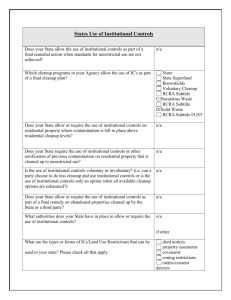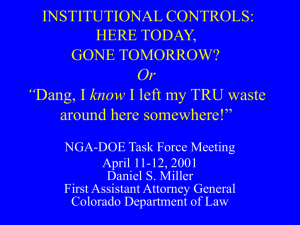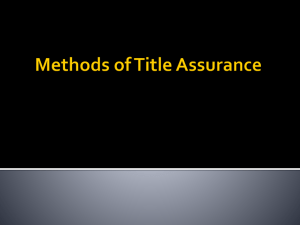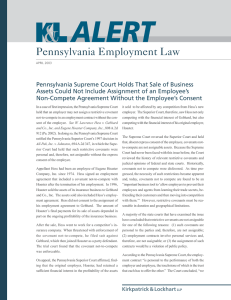Pennsylvania Adopts and Modifies the Uniform Environmental Covenants Act Natural Resources Alert
advertisement
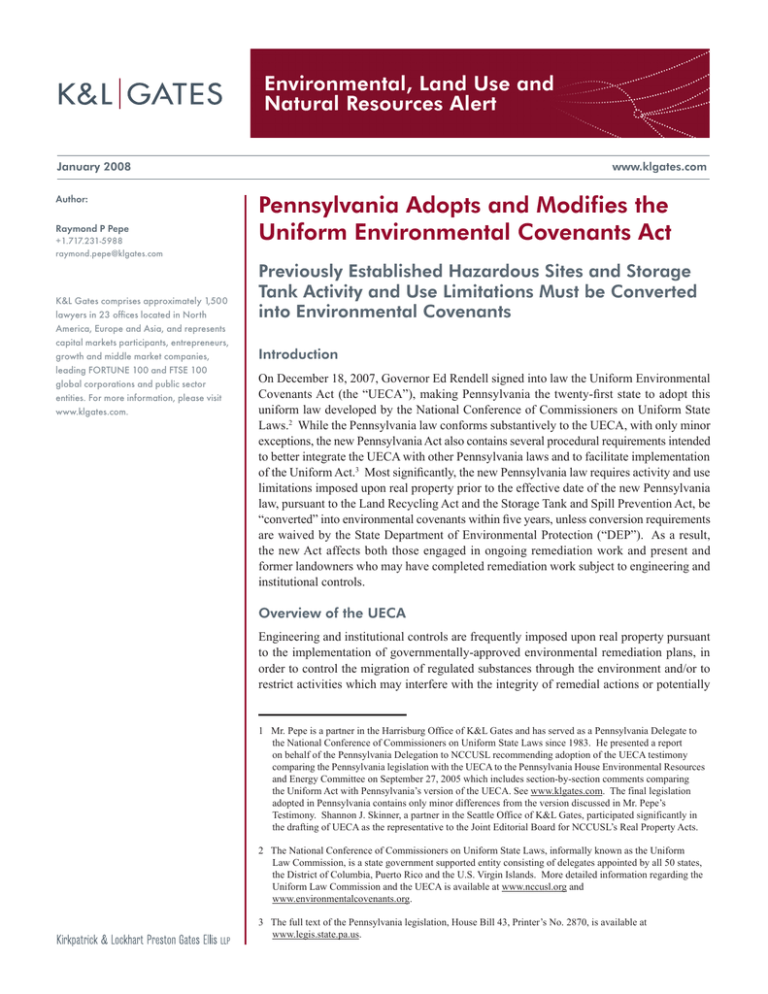
Environmental, Land Use and Natural Resources Alert January 2008 Author: Raymond P Pepe +1.717.231-5988 raymond.pepe@klgates.com K&L Gates comprises approximately 1,500 lawyers in 23 offices located in North America, Europe and Asia, and represents capital markets participants, entrepreneurs, growth and middle market companies, leading FORTUNE 100 and FTSE 100 global corporations and public sector entities. For more information, please visit www.klgates.com. www.klgates.com Pennsylvania Adopts and Modifies the Uniform Environmental Covenants Act Previously Established Hazardous Sites and Storage Tank Activity and Use Limitations Must be Converted into Environmental Covenants Introduction On December 18, 2007, Governor Ed Rendell signed into law the Uniform Environmental Covenants Act (the “UECA”), making Pennsylvania the twenty-first state to adopt this uniform law developed by the National Conference of Commissioners on Uniform State Laws.2 While the Pennsylvania law conforms substantively to the UECA, with only minor exceptions, the new Pennsylvania Act also contains several procedural requirements intended to better integrate the UECA with other Pennsylvania laws and to facilitate implementation of the Uniform Act.3 Most significantly, the new Pennsylvania law requires activity and use limitations imposed upon real property prior to the effective date of the new Pennsylvania law, pursuant to the Land Recycling Act and the Storage Tank and Spill Prevention Act, be “converted” into environmental covenants within five years, unless conversion requirements are waived by the State Department of Environmental Protection (“DEP”). As a result, the new Act affects both those engaged in ongoing remediation work and present and former landowners who may have completed remediation work subject to engineering and institutional controls. Overview of the UECA Engineering and institutional controls are frequently imposed upon real property pursuant to the implementation of governmentally-approved environmental remediation plans, in order to control the migration of regulated substances through the environment and/or to restrict activities which may interfere with the integrity of remedial actions or potentially 1 Mr. Pepe is a partner in the Harrisburg Office of K&L Gates and has served as a Pennsylvania Delegate to the National Conference of Commissioners on Uniform State Laws since 1983. He presented a report on behalf of the Pennsylvania Delegation to NCCUSL recommending adoption of the UECA testimony comparing the Pennsylvania legislation with the UECA to the Pennsylvania House Environmental Resources and Energy Committee on September 27, 2005 which includes section-by-section comments comparing the Uniform Act with Pennsylvania’s version of the UECA. See www.klgates.com. The final legislation adopted in Pennsylvania contains only minor differences from the version discussed in Mr. Pepe’s Testimony. Shannon J. Skinner, a partner in the Seattle Office of K&L Gates, participated significantly in the drafting of UECA as the representative to the Joint Editorial Board for NCCUSL’s Real Property Acts. 2 The National Conference of Commissioners on Uniform State Laws, informally known as the Uniform Law Commission, is a state government supported entity consisting of delegates appointed by all 50 states, the District of Columbia, Puerto Rico and the U.S. Virgin Islands. More detailed information regarding the Uniform Law Commission and the UECA is available at www.nccusl.org and www.environmentalcovenants.org. 3 The full text of the Pennsylvania legislation, House Bill 43, Printer’s No. 2870, is available at www.legis.state.pa.us. Environmental, Land Use and Natural Resources Alert expose the public to regulated substances. Typical engineering controls include installation of slurry walls, liner systems, caps, leachate collection systems and groundwater recovery trenches. Commonly used institutional controls consist of prohibitions upon the extraction or use of groundwater or the development of property for residential uses. While engineering and institutional controls have long been incorporated into deed restrictions intended to run with title to land for purposes of implementing environmental response projects, questions regarding the legality and enforceability of these controls involve a complex body of common law relating to equitable servitudes.4 The UECA seeks to resolve these problems and establish a clear, explicit and uniform body of state law intended to facilitate and promote the remediation of contaminated sites. Specifically, the UECA provides that: •Environmental covenants may be used to establish and maintain activity and use limitations upon property pursuant to environmental response projects approved by any state or federal agency. •Any person, including the current property owner and governmental agencies, may be the grantee of rights and obligations established by an environmental covenant. •Notice regarding the establishment of a covenant must be given to all parties with recorded interests in property or in possession of property and to local political subdivisions in which a property is located. However, unless modified by a subrogation agreement, environmental covenants do not affect prior holders of interests in land, such as mortgages, and parties to subrogation agreements do not 4 assume affirmative obligations with respect to environmental covenants. Foreclosures by a holder of an interest with priority in title may terminate an environmental covenant. •While extensive amounts of information may be included in environmental covenants, to be valid environmental covenants must merely (1) state they are environmental covenants established pursuant to the UECA; (2) contain a description of the property; (3) describe the activity and use restrictions; (4) identify every holder; (5) be signed by the agency approving the covenant, every holder and every owner of the fee simple; and (6) identify the agency which approved the covenant and the location of the administrative record pertaining to the environmental response project pursuant to which the covenants were established. •Environmental covenants may be used to establish notice requirements for the transfer of property or specified interests in property; to require periodic reporting; and to grant rights of access to property. •Environmental covenants must be approved by the government agency responsible for an environmental response project and must be recorded both at the county level and with an official State Registry (designated by the Pennsylvania law to be established by DEP). After covenants are filed with the State Registry, a uniform and simple form may be used to record environmental covenants in county land records. Unless restricted, environmental covenants are perpetual in duration, but may be modified Historically, for example, questions existed regarding whether holders of restrictive covenants must own interests in real property; whether the burdens and benefits of servitudes may be assigned to new holders; whether servitudes may impose affirmative duties rather than only negative obligations; and whether current property owners may designate themselves as holders of covenants.Questions have also arisen regarding how to ensure that environmental covenants will in fact establish obligations that will burden and benefit future owners of property, rather than merely creating rights and obligations that are personal to original parties to the covenants. While the adoption of the American Law Institute’s Restatement of the Law Third, Property (Servitudes) was intended to address many of these issues, notwithstanding the deference provided by many courts to the ALI’s recommendations, the Restatement obviously lacks the force of law. January 2008 | 2 Environmental, Land Use and Natural Resources Alert or terminated by the consent of the parties to the covenant and the government agency that approved the project. •An environmental covenant may not be amended, terminated, or assigned to a new holder without the consent of the other parties to the covenant, including every person who originally signed the covenant, unless such rights are modified by the terms of a covenant or waived by a party to a covenant. However, environmental covenants may be judicially amended or terminated without the consent of all parties (other than the agency that approved the covenant) based on the doctrine of changed circumstances or in situations where the consent of all parties cannot be obtained. •Civil actions for injunctive or equitable relief for violations of environmental covenants may be brought by parties to covenants, agencies which approve covenants, any persons whose interests in real property or collateral liability may be affected by alleged violations, and units of local government in which affected properties are located.5 •Instruments imposing activity or use limitations that comply with the requirements of the new law, except for recording prior to the effective date of the UECA, are deemed valid notwithstanding any common law impediments to the establishment and enforcement of equitable servitudes. Pennsylvania Amendments to the UECA The Pennsylvania version of the UECA substantively modifies provisions of the Uniform Act in the following areas:6 •While the Uniform Act includes provisions confirming the validity of servitudes imposing activity and use limitations pursuant to remediation projects prior to the Act’s effective date, i.e., February 16, 2008, the Pennsylvania Act requires all previously established activity and use limitations to be “converted” into environmental covenants within 60 months, unless mandatory conversion is waived by the Department of Environmental Protection. Conversion, however, does not mean establishing new activity or use restrictions or changing the terms and conditions of existing covenants, unless required by DEP (or another agency approving an environmental response project) or to conform to the requirements of the UECA. Instead, the process may only require filing the covenants with the State Registry and recording notice of establishment of the covenants in county land records. •The Pennsylvania Act requires environmental covenants to be used to establish activity and use limitations for projects approved pursuant to the Land Recycling Act and the Storage Tank and Spill Prevention Act by DEP. •Although the Pennsylvania Act provides that the failure to convert activity and use limitations into environmental covenants does not affect their validity and enforceability, the DEP is authorized to issue enforcement orders to compel such conversions. •Consistent with provisions of the Land Recycling Act, the new Pennsylvania law provides for deemed approval of environmental covenants within 90 days of the receipt by DEP of all information reasonably required to make a 5 Provisions of the UECA allowing third parties to commence enforcement actions may prove problematic is some circumstances, but the Uniform Act does not provide for citizen suits or the recovery of attorneys fees in enforcement actions. 6 The Pennsylvania legislation also contains stylistic revisions to the Uniform Act and several other provisions intended to clarify the intent of the UECA, as described in Mr. Pepe’s September 27, 2005 testimony to the Pennsylvania House Environmental Resources and Energy Committee. January 2008 | 3 Environmental, Land Use and Natural Resources Alert determination regarding approval or disapproval of an environmental covenant. In the event of a deemed approval, an environmental covenant presented for recording and registration must include a statement that the environmental covenant was deemed approved by operation of law. •Under the Pennsylvania Act, any waivers by the parties of their right to consent to amendments of environmental covenants must be recorded. •While the Uniform Act provides that a description of the contamination and remedy is optional, the Pennsylvania law mandates that all environmental covenants provide “a brief narrative description of the contamination and remedy.” •The Pennsylvania Act allows DEP to place conditions on the approval of covenants. •Decisions by the DEP taken with respect to environmental covenants (including imposition of conditions) are subject to review by the Environmental Hearing Board. •Provisions in the Uniform Act expressly making agency refusals to consent to the amendment or termination of environmental covenants subject to review were deleted from the Pennsylvania law. As a result, questions remain whether the refusal by DEP to consent to an amendment or termination of an environmental covenant constitutes final agency actions subject to review by the Environmental Hearing Board. •An environmental covenant may not be terminated or modified by condemnation without the consent of the agency that approved the environmental covenant. •Following a precedent established by the Ohio version of the UECA, the Pennsylvania law clarifies that nothing in the legislation is intended to restrict or prohibit the execution of private environmental covenants not reviewed or approved by other agencies to the extent otherwise authorized by law. •All documents filed in the State Registry established for environmental covenants are classified as “public records” under the Pennsylvania Right to Know Act. •Deed notice requirements imposed by the Solid Waste Management Act regarding the presence of hazardous substances on property may be satisfied by reference to a recorded environmental covenant. •The Environmental Quality Board is empowered to adopt regulations and to impose fees as it deems necessary to implement the UECA. Next Steps Land owners currently in the midst of seeking approval for environmental remediation plans should review the requirements of the UECA to ensure that any engineering or institutional controls imposing activity and use limitations on property conform to the requirements of the new law. Similarly, current and former land owners who previously obtained agency approvals for remediation plans should ensure that their covenants comply with the substantive requirements of the new law and have been appropriately recorded. In addition, documentation pertaining to previously established covenants should be collected and maintained to facilitate the proper registration and January 2008 | 4 Environmental, Land Use and Natural Resources Alert recording and, where necessary, amendment of previously established activity and use restrictions. •Will owners of prior interests in land be asked to subordinate their interests to the covenants? In considering how to establish environmental covenants and whether to modify existing covenants to comply with the requirements of the new law, particular attention should be paid to the following questions: •Should consents to the amendment or termination of covenants be obtained from particular parties? •Who will be designated as the holder of an environmental covenant? •Will any specific rights be extended to holders who do not hold the current title to the property, such as the right to access property, conduct tests, and receive periodic reports? •Should covenants include specific termination and amendment provisions? •Should covenants specify the terms and conditions under which consents to the assignment and transfer of rights and obligations must be approved by other parties? Requirements regarding establishment and use of the State Registry, including fees required to be paid to submit environmental covenants, are expected to be announced by DEP in the near future. •Have all parties with interests in property subject to a covenant, as well as political subdivisions within which the property is located, been properly identified and notified of the establishment of the covenant? K&L Gates comprises multiple affiliated partnerships: a limited liability partnership with the full name Kirkpatrick & Lockhart Preston Gates Ellis LLP qualified in Delaware and maintaining offices throughout the U.S., in Berlin, and in Beijing (Kirkpatrick & Lockhart Preston Gates Ellis LLP Beijing Representative Office); a limited liability partnership (also named Kirkpatrick & Lockhart Preston Gates Ellis LLP) incorporated in England and maintaining our London office; a Taiwan general partnership (Kirkpatrick & Lockhart Preston Gates Ellis) which practices from our Taipei office; and a Hong Kong general partnership (Kirkpatrick & Lockhart Preston Gates Ellis, Solicitors) which practices from our Hong Kong office. K&L Gates maintains appropriate registrations in the jurisdictions in which its offices are located. A list of the partners in each entity is available for inspection at any K&L Gates office. This publication/newsletter is for informational purposes and does not contain or convey legal advice. The information herein should not be used or relied upon in regard to any particular facts or circumstances without first consulting a lawyer. Data Protection Act 1998—We may contact you from time to time with information on Kirkpatrick & Lockhart Preston Gates Ellis LLP seminars and with our regular newsletters, which may be of interest to you. We will not provide your details to any third parties. Please e-mail london@klgates.com if you would prefer not to receive this information. ©1996-2008 Kirkpatrick & Lockhart Preston Gates Ellis LLP. All Rights Reserved. January 2008 | 5

